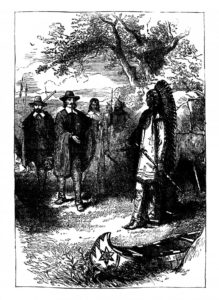
Exactly 400 years ago this past fall, it is believed that the first Thanksgiving occurred between about 90 Wampanoag Native Americans and 53 Pilgrims. It was a bit different than the Thanksgiving we know today.
After all, there were no parades or football games to watch, and the meal festivities lasted three days with items like lobster and venison playing a more prominent role than turkey. It makes you wonder what else was a far cry from the modern Thanksgiving festivities.
What about oral hygiene back then? It did exist in fact, but one group of Thanksgiving attendees was taking far better care of their teeth. Keep reading to find out who would’ve earned a gold star if going to the dentist in the 1600s was actually a thing.
Pilgrims and the Pitfalls of Preserved Food
In order to survive their 66-day voyage from England to America, Pilgrims stocked their ships with salted dried meat, dried fruit, and hardtack – a dried biscuit similar to a saltine cracker. These are terrible foods for teeth, particularly the last two, as they easily adhere to enamel and fuel cavity-causing oral bacteria.
Since water distillation was not perfected yet, sailors of the time couldn’t drink much water without risking sickness and death. So, the primary beverages onboard were beer and wine. Wine is highly acidic and stains teeth, which sets the stage for cavities without brushing and rinsing, which the Pilgrims were not doing.
The Wampanoag People Put Their Teeth in a Positive Situation
Expert hunters and gatherers, these people were able to live entirely off the land. Their diet primarily consisted of maize (corn), beans, squash, fish, and other catches from the sea, as well as game such as venison. The Native Americans usually didn’t incorporate the spices that were more prominent in Europe.
They ate a lot of fresh fruit and nuts, which helped keep plaque off their teeth. With a fresh diet that was high in fiber, the Wampanoag people had impressively well-maintained teeth and gums for that time period.
Natural Toothcare Proved Superior at the Time
Native Americans cleaned their teeth and gums by chewing on fresh herbs. Sage, cucacua, and mint freshened their breath.
They also used chewsticks. These twigs had one end frayed by a rock that was used for brushing, while the other end was sharpened for use as a toothpick. They chewed on the frayed end to clean debris from their teeth.
Primitive Toothbrushes for Settlers
While the Native Americans had their effective version of a toothbrush, it was not a common tool among Pilgrims. Toothbrushes of the time were made with a bone handle and bristles created from hog’s hair, not to mention the fact that they were mostly used by upper-class society and not sailors.
Add it all up and the Wampanoag people had the better teeth at the first Thanksgiving by a wide margin. It makes sense, considering the Pilgrims didn’t even have regular access to clean drinking water until their transatlantic journey was over.
Even though the Wampanoag people did a fantastic job for their oral health by 1620s standards, you and your family have a better awareness of the foods and beverages that are tooth-friendly, far superior toothbrush options, and having consistent access to clean water makes oral hygiene so much simpler. The poor Pilgrims desperately needed an experienced dentist with state-of-the-art tools to save their traumatized teeth, and fortunately, as a modern-day citizen in Garland, such a resource is just a car ride away for you!
About the Practice
At North Garland Family Dental, our team has been working hard for the oral health of local patients for decades and we hope to get the opportunity to take care of your smile, as well. We can provide both general and specialty dental services at our location, so you don’t have to drive all over DFW for treatment. It sure sounds like the Pilgrims were walking dental emergencies, and if you ever need urgent help just know that we are a phone call away. Hopefully, you take excellent care of your teeth like the Wampanoag people, and then a dental cleaning and exam will be all you need to get off to a great start in 2022! To make an appointment, just visit our website or call (972) 530-7979.









